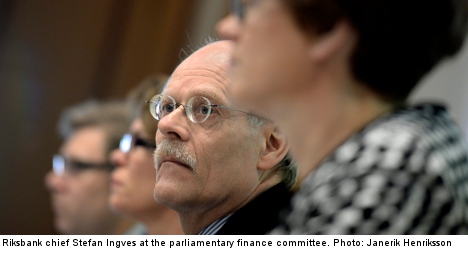The krona rose 0.36 percent against the euro to 8.2996, the highest level since August 29th 2012, reported Bloomberg News.
Sweden’s export-heavy economy is sensitive to fluctuations in the value of the krona.
Ingves appeared at a meeting of the parliamentary finance committee on Thursday to take questions from committee members.
VIDEO: Parliamentary finance committee meeting with Riksbank representatives (in Swedish)
“We have, since the mid-1990s, worked on the principal that it is not technically possible nor desirable to fine tune inflation in the short-term, which could lead to fluctuations.”
In January, the Riksbank decided to keep the benchmark interest rate at 1 percent. Not all of its board members agreed with the decision. Karolina Ekholm wanted the central bank to cut the key repo rate to 0.75 percent, with Lars E.O. Svensson advocating a drop to 0.5 percent.
At the time, Ingves cited rising consumer confidence as a reason to keep the rate unchanged.
“The unease on the financial markets has declined, and households and companies, both in Sweden and abroad, have become slightly more optimistic with regard to the future,” he said.
Bloomberg reported on Thursday that Swedish consumer confidence was up in February.
The Local/at



 Please whitelist us to continue reading.
Please whitelist us to continue reading.
Member comments